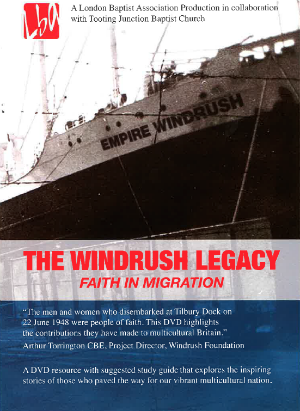The Windrush Legacy - Faith in Migration
The arrival of several hundred people from the Caribbean in Essex on 22 June 1948 marked a step change in immigration to Britain - and now the voices of the Windrush generation, and the vital role faith played in overcoming the difficulties they faced, have been captured in a new film that links to issues of immigration and racism today
The Windrush Legacy - Faith in Migration DVD resource has been produced by the London Baptist Association (LBA) in collaboration with Tooting Baptist Church. As well as telling the story of the migration of the Windrush generation to Britain, it features the views of white British people at that time, those of their children and grandchildren, and the perspectives of newer migrants to these shores.

The connecting theme for all is how their Christian faith has helped and sustained them through the changing circumstances of life.
LBA Regional Minister Kumar Rajagopalan is one of the film's producers, and he said faith and the age of the participants had all played a role in making the resource. 'There have been quite a lot of resources about Windrush, but nothing from a faith perspective. We wanted to look at how faith has enabled the Windrush generation to cope with the various pressures they have faced.
'Additionally most of them are in their 80s now - books are good, but we thought to record their stories and get them in an audio-visual format would help to understand them more widely.'
The 492 passengers on the
Empire Windrush marked the beginning of a new phase in immigration to Britain in terms of numbers and the increased level of diversity they brought. Several attend Tooting Junction Baptist Church, whose pastor is Osoba Otaigbe. He said, '
Our past stories influence our present, when we understand it and reflect on it constructively it brings out the best in us.
'But when suppressed you never know what the next generations will make of it. As a church with many Windrush generation members we wanted to be part of sharing in this story. The DVD tells inspiring stories of those who paved the way for our vibrant multicultural Britain, how faith sustained them in the midst of great challenges.'
That racism still exists - even if more covert now than it was in the 1950-70s - is one of the main themes to have emerged, added Kumar. 'While many spoke of the situation having improved, it's still there, and there is still work to do.'
One of the aims of the resource, which is accompanied by a booklet to provoke small/home group discussions, is whether our response to immigrations can be conducted on more Christian terms.
'Despite the rhetoric, there will still be migrants coming to this nation, so how can we speak about it in a more Christian way?' said Kumar.
Another key intended outcome is for people 'to appreciate and value the contribution that the Windrush generation has made to British society, particularly their fight for a more just and fairer society,' Kumar continued.
This links to the campaign for a Windrush Day - an opportunity to give thanks for the positive contributions made by those who have come from overseas to Britain. This was launched a year ago, at the 65th anniversary of the Windrush arrival.
A short service is planned in Windrush Square in Brixton this Sunday (22 June) at 3.15pm, to recognise the invaluable contribution that migrants have made to Britain over many years, with particular reference to faith and their sacrifice in the First World War. The programme will last about an hour.
The majority of the passengers on the Windrush in 1948 were from Jamaica, and their arrival has contributed to the rich association between Jamaican and British Baptists. A series of events has been organised this year to mark the bicentenary of this relationship
Baptist Times, 17/06/2014